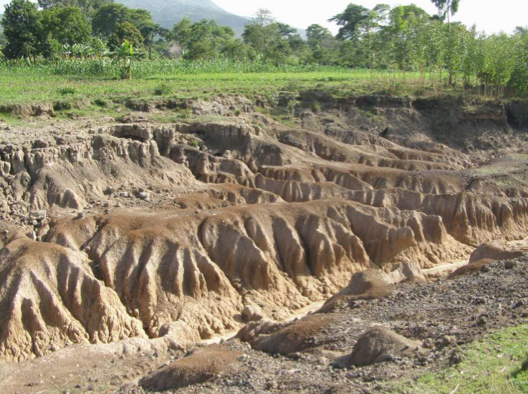Causes of Soil Depletion
The main causes of soil depletion are the accumulation of pathogenic microorganisms (fungi, bacteria, viruses) that inhibit the growth of certain plants by their secretions or by infesting the roots; The
development of pests and weeds, and soil exhaustion. Some other causes are given below-
1. Loss of top soil by erosion: This is the removal of the topmost soil by either water or wind. When the topmost soil is taken away, it exposes the layer beneath for further loss, as nutrients are
taken away as the topmost soil is removed.
2. Nutrient Leaching: It is the leaching of nutrients deep down the soil by water draining down the
soil. This leads to displacement of nutrients beyond the reach of roots of plants.
3. Continuous cropping: It is the continuous cultivation of crops on the same piece of land without
allowing the land to fallow. This over exploitation and excessive use of nutrients in the soil leads to
their depletion eventually.
4. Compacting: Soil compacting is as a result of the impact of humans, animals and machines on a piece of land long enough to disturb the soil structure. Over long periods, essential components of the
soil are lost such as soil air, microorganisms and certain plants that may offer some protection. This is mainly through walking and use of land for certain human activities, impact form, cars and
machinery as they apply direct force to the soil.
5. Flooding and excessive irrigation: This leads to excessive water present on land. Excess water
drains away nutrients from the soil rendering its deficient.
6. Crop removal: some crops offer some form of protection for soil against soil erosion and
evaporation which might otherwise lead to loss of soil nutrients and water.
7. Decrease in organic matter content and soil bioactivity: The decreased levels of organic matter causes a strong reduction in soil fertility as it plays several roles in soil. The microbial activities in
soil decrease due to reduced levels of organic matter. These microbial activities play significant role
in
nutrient availability and recycling. Decreased organic matter levels results in poor physical, chemical
and biological properties.
8. Soil acidification, salinization and alkalinization: Acidification, salinization or alkalinization causes reduction in soil fertility, and eventually lead to
problems of nutrient deficiencies, toxicities and imbalances. Factors responsible for soil degradation
are generally interrelated.
9. Inefficient soil management: Poor or inefficient soil management results in decreased soil fertility. Improper crop rotations followed may decrease the soil fertility tremendously. Excessive soil tillage
leads to erosion of the soil which leads to reduced soil fertility.
10. Soil pollution: Soil pollution caused by indiscriminate use of agrochemicals and heavy metals reduces fertility of soil by affecting the soil biological properties. The
growth of useful soil organisms is adversely affected which eventually causes a decline in biological
soil fertility.
You can read more articles about Soil Science
Useful Agricultural Websites
Food and Agricultural Organization

